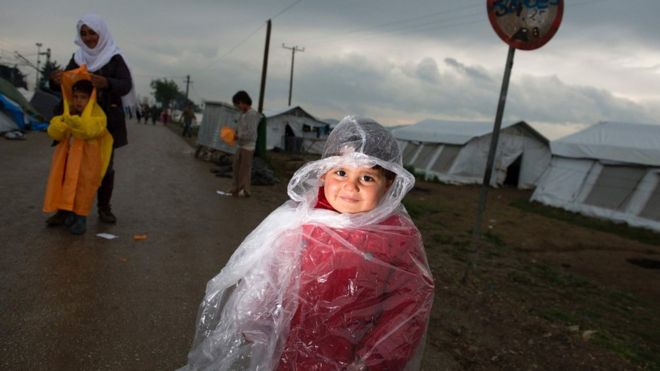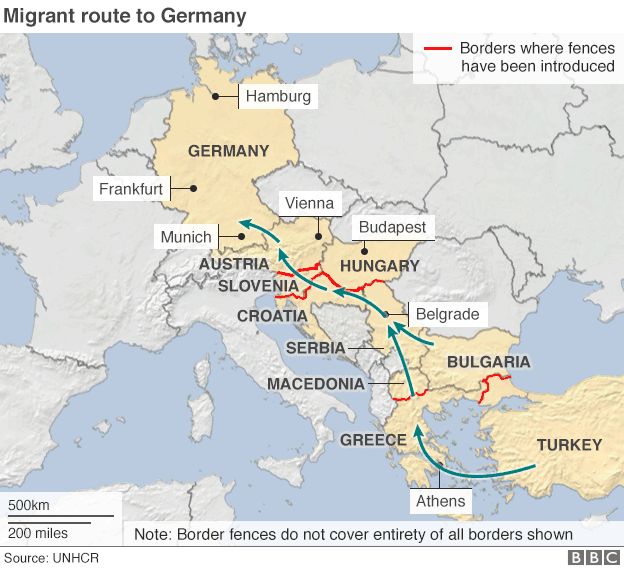Migrant crisis: EU 'to grant Turkey visa-free travel'
- 2 hours ago
- Europe
 AFP
AFP
The European Commission is to grant Turkey conditional approval this Wednesday for visa-free travel within the EU's Schengen area, sources have told the BBC.
The move is part of a deal in which Turkey has agreed to take back migrants who have crossed the Aegean to Greece.
But Turkey must still meet EU criteria, BBC Europe Editor Katya Adler says.
She says the EU fears that if the visa agreement slides, so will Turkey's commitment to stopping migrants.
The huge numbers of migrants and refugees arriving in Europe from Turkey, and from North Africa, has caused a political crisis among EU states.
Analysis by Katya Adler, BBC Europe Editor
If the European Commission (the EU's executive body) does make the recommendation this Wednesday that Turks be granted visa-free travel in Europe's Schengen area, as whispers from well-placed EU sources suggest, then it will be doing so holding its nose and its breath.
The freedom of speech; the right to a fair trial and revising terrorism legislation to better protect minority rights - these are just some of the criteria demanded by the EU of countries before it lifts visa requirements even for short-term travel.
It is hard to see how Turkey could be described as meeting these conditions. Ankara increasingly cracks down on its critics in a manner more autocratic than democratic.
But these are desperate times for the EU. The European Commission and most EU governments are under huge public pressure to ease the migrant crisis.
My sources say the commission will therefore keep to the agreed script. But they insist this is no blank cheque. Turkey will get the green light over visas this week to keep it sweet. But it will also be informed of the outstanding criteria it still needs to meet.
Under the EU-Turkey agreement, migrants who have arrived illegally in Greece since 20 March are to be sent back to Turkey if they do not apply for asylum or if their claim is rejected.
For each Syrian migrant returned to Turkey, the EU is to take in another Syrian who has made a legitimate request.
Human rights groups question the deal's legality and argue that Turkey is not a safe place to return people to.
Last month, however, European Council President Donald Tusk said the deal had begun to produce results.
He praised the Turkish government as "the best example in the world on how to treat refugees", despite criticism by rights groups of the agreement.
At the same time, Turkish PM Ahmed Davutoglu said his country had fulfilled its part of the agreement and that the issue of the visa waiver for the EU's Schengen area was "vital" for Turkey.
The agreement says Turkey must meet 72 conditions by 4 May to earn access by the end of June, but diplomats have said that only about half of those points have been met so far.

A note on terminology: The BBC uses the term migrant to refer to all people on the move who have yet to complete the legal process of claiming asylum. This group includes people fleeing war-torn countries such as Syria, who are likely to be granted refugee status, as well as people who are seeking jobs and better lives, who governments are likely to rule are economic migrants.
- Short migrant journey back to Turkey
- EU-Turkey migrant deal: A Herculean task
- Turkey has European Union over a barrel
- The tricky business of solving Europe's migrant crisis
- EU migration: Crisis in seven charts
- In depth report
- EU-Turkey 'one-in one-out' migrant plan
- Migrant crisis: Have EU promises been kept?
- Why is EU struggling with migrants and asylum?
- How is migrant crisis dividing EU countries?
- Schengen: EU free movement deal explained
Video
In depth
Europe
SPORT Leicester win Premier League title
- 2 May 2016
- Football
- 594
Berlin airport 'whistleblower poisoned'
- 2 May 2016
- Europe
Mass brawl in Turkish parliament
- 2 May 2016
- Europe












No comments:
Post a Comment
Please leave a comment-- or suggestions, particularly of topics and places you'd like to see covered